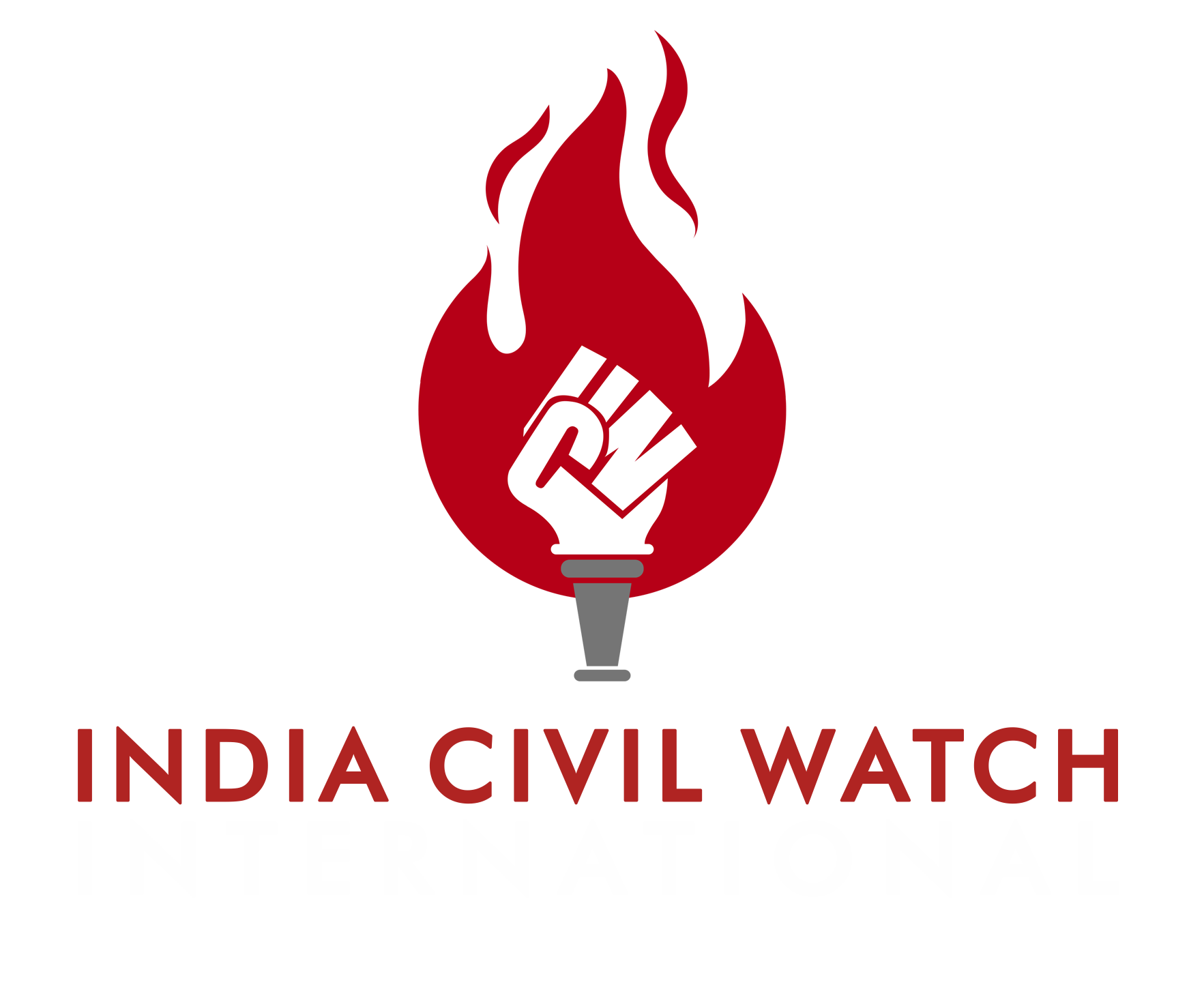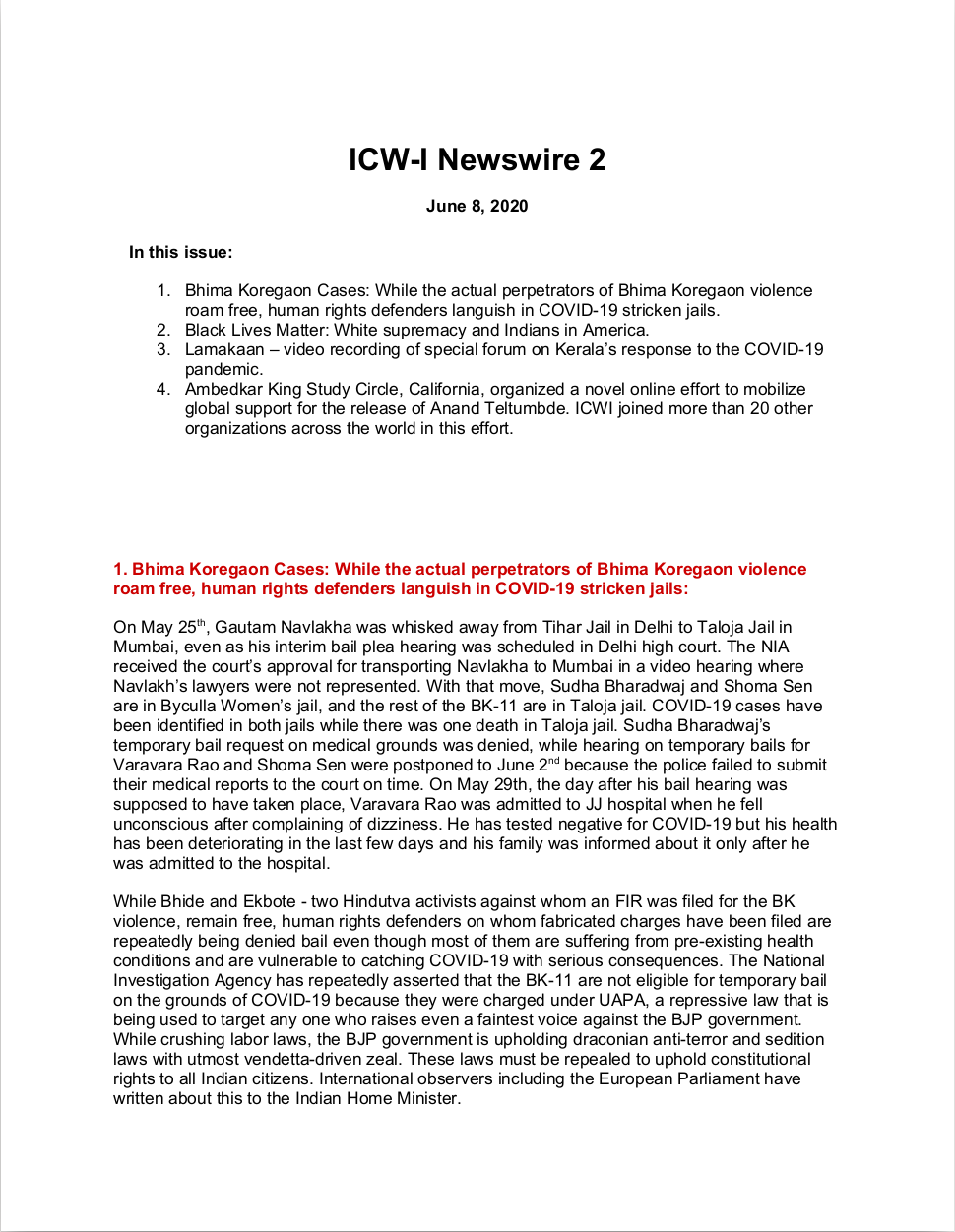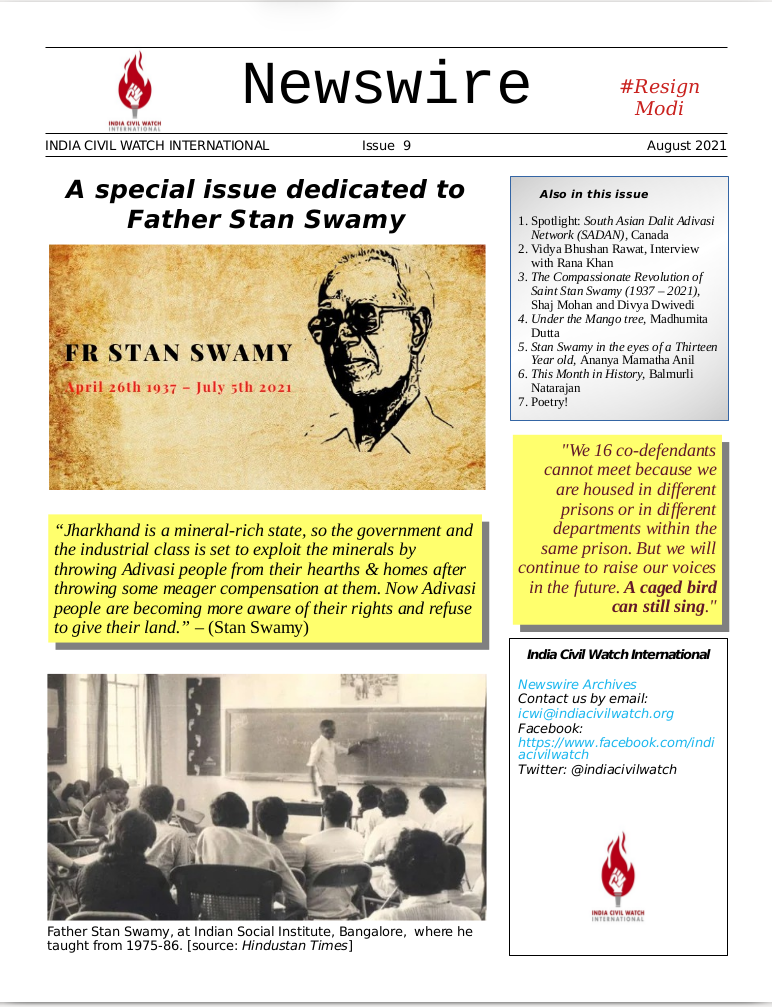1. Bhima Koregaon Cases: While the actual perpetrators of Bhima Koregaon violence roam free, human rights defenders languish in COVID-19 stricken jails
On May 25th, Gautam Navlakha was whisked away from Tihar Jail in Delhi to Taloja Jail in Mumbai, even as his interim bail plea hearing was scheduled in Delhi high court. The NIA received the court’s approval for transporting Navlakha to Mumbai in a video hearing where Navlakh’s lawyers were not represented. With that move, Sudha Bharadwaj and Shoma Sen are in Byculla Women’s jail, and the rest of the BK-11 are in Taloja jail. COVID-19 cases have been identified in both jails while there was one death in Taloja jail. Sudha Bharadwaj’s temporary bail request on medical grounds was denied, while hearing on temporary bails for Varavara Rao and Shoma Sen were postponed to June 2nd because the police failed to submit their medical reports to the court on time. On May 29th, the day after his bail hearing was supposed to have taken place, Varavara Rao was admitted to JJ hospital when he fell unconscious after complaining of dizziness. He has tested negative for COVID-19 but his health has been deteriorating in the last few days and his family was informed about it only after he was admitted to the hospital.
While Bhide and Ekbote – two Hindutva activists against whom an FIR was filed for the BK violence, remain free, human rights defenders on whom fabricated charges have been filed are repeatedly being denied bail even though most of them are suffering from pre-existing health conditions and are vulnerable to catching COVID-19 with serious consequences. The National Investigation Agency has repeatedly asserted that the BK-11 are not eligible for temporary bail on the grounds of COVID-19 because they were charged under UAPA, a repressive law that is being used to target any one who raises even a faintest voice against the BJP government. While crushing labor laws, the BJP government is upholding draconian anti-terror and sedition laws with utmost vendetta-driven zeal. These laws must be repealed to uphold constitutional rights to all Indian citizens. International observers including the European Parliament have written about this to the Indian Home Minister.
- European Parliament Subcommitte on Human Rights writes to Amit Shah highlighting BK-11 and the recent anti-CAA/anti-NRC arrestees https://mediascanner.in/breaking-eu-flags-human-rights-concerns-to-indian-home-minister/
- Delhi HC Irked by NIA’s ‘Unseemly Haste’ in Sending Gautam Navlakha Away to Mumbai https://thewire.in/law/delhi-high-court-gautam-navlakha-nia
- Mumbai court rejects bail to Sudha Bharadwaj arrested in Elgar Parishad case https://indianexpress.com/article/cities/mumbai/mumbai-court-rejects-bail-to-sudha-bharadwaj-arrested-in-elgar-parishad-case-6432991/
- Poet, Activist Varavara Rao Shifted to Hospital After He Faints in Mumbai Jail https://thewire.in/rights/varavara-rao-shifted-to-hospital-mumbai-jail
- Varavara Rao’s wife demands his release https://telanganatoday.com/varavara-raos-wife-demands-his-release
- Citing health, Varavara Rao’s daughters urge Maharashtra CM Uddhav Thackeray for his parole https://www.newindianexpress.com/nation/2020/may/27/citing-health-raos-daughters-urge-thackeray-for-his-parole-2148532.html
- Koregaon Bhima Case: Ex-Judge Mulls Moving Court on Centre’s NIA Move https://thewire.in/politics/koregaon-bhima-case-ex-judge-mulls-moving-court-on-centres-nia-move
Social Media to follow: @TeltumbdeA, and Facebook RealDrAnandTeltumbde
2. The uprising against police brutality in the U.S.
The recent public lynching of George Floyd by the Minneapolis police has sparked a nationwide uprising across the U.S. With growing calls for an end to the epidemic of white supremacist state violence against Black people, protesters in every major city have taken to the streets demanding justice, accountability, and systemic change.
Anti-Black racism has features akin to a pandemic today, and many people of color are complicit in it, in the United States and across the world. Furthermore, similar and comparable forms of anti-minority ideologies permeate the thinking and worldviews of majority populations in countries like India, where the rise of Hindutva has been accompanied by the intensification of multiple forms of state and extra-state violence against Dalits and Muslims. The horrific brutalities meted out to Kashmiris under conditions of a military occupation are repeated in smaller, yet equally lethal ways, by police across India, with thousands of men, women and children enduring unending daily assaults on their bodies and dignity. Police violence in the U.S. or in India therefore is not an aberration, but a systemic facet of repressive rule, most visibly evident in the vast arsenals of repressive tools, techniques, and strategies that are being shared under the guise of security cooperation.
In grappling with white supremacy or Hindutva we tend to focus on overt forms of violence and bigotry, but we ought to focus also on the shared sentiments that make both ideologies dangerously mundane. Especially to ordinary people who may not consider themselves adherents, but who share and partake in the premises and promises of supremacist views. Both white-supremacists and Hindutva adherents share a deep disdain for social equality and justice. Yet today in the U.S. many Indians who publicly voice support for, or even participate in protests in defense of Black lives, actively support the Modi regime and its ongoing assaults on Muslims in India. The most egregious example of this contradictory positioning is to be found in the public proclamations of the RSS’s ‘public relations’ wing in the U.S., the so-called Hindu American Foundation (HAF). Its recent tweet on the protests claims that “Dharma demands us to fight for racial justice.” The same HAF also fights to defend the RSS – India’s most ferocious enemy of social justice and one that is inherently anti-Dalit and anti-Muslim – in the name of Dharma. What is this Dharma that HAF claims guides its endeavors? HAF has not only consistently defended the RSS and its many atrocities, but also echoes the Hindutva perspective on a range of issues. It’s public posturing as an advocate of ‘human rights’ in America stands in stark contradiction with its rootedness in an ideology that enshrines hatred and violence against minorities in India.
In contrast to the HAF’s fraudulent posturing,other voices from Indian communities across the U.S. are attesting to the common humanity binding struggles for justice and dignity in the U.S. and in India. In one instance, an Indian American man offered shelter in his home to seventy protesters escaping police violence. The Ambedkar King Study Circle, a California-based anti-caste organization whose mission is to “challenge caste, class, race, gender and religious oppression and oppressors on ideological, political and social fronts” issued a strong statement condemning the lynching of George Floyd, while calling out the hypocrisy of many Indian organizations that remain silent on caste oppression. Renowned Dalit leader Martin Macwan, noting that Dalits in India suffer many of the same forms of suffocating violence that Black people in the U.S. endure, called for a symbolic lighting of a candle on June 10th, when George Floyd will be laid to rest. We in the diaspora have a historic responsibility to stand in solidarity with the struggle for Black liberation, and must work within our communities to address anti-Black racism, and the anti-Muslim and anti-Dalit bigotry rife among so many. We call upon all Indians residing in the U.S. to take a firm stand in the fight for racial justice in the U.S. while also affirming their defense of the rights of millions of Muslims, Dalits, Adivasis and other people beleaguered by the police state in India. Only in recognizing that the struggle for racial justice in America is consistent with the fight for social justice in India, may we be in a position to contribute to either. George Floyd: Rest in Power!
- Indian Support for George Floyd, While We Remain Silent on Violence at Home, Is Hypocritical, Performative Wokeness https://theswaddle.com/indian-support-for-george-floyd-while-we-remain-silent-on-violence-at-home-is-hypocritical-performative-wokeness/
- Rahul Dubey Opened His Door to Over 70 Protesters, Protecting Them From Police https://youtu.be/t_kiPuIIa-w
- D.C. Protesters Hail The Hero Of Swann St., Who Sheltered Them From Arrest https://www.npr.org/2020/06/02/868324634/d-c-protesters-hail-the-hero-of-swann-st-who-sheltered-them-from-arrest
- Ambedkar King Study Circle (AKSC) Strongly Condemns the Killing of George Floyd and Appreciates the Courage of the People who demand Justice on the streets https://akscusa.org/
- Situation of Dalits in India similar to Blacks in US, says renowned HR activist Macwan in letter to Trump http://twocircles.net/2020jun04/437309.html
- Asians for Black Lives https://a4bl.tumblr.com/
- South Asians for Black Lives https://mailchi.mp/00ce67932142/southasians2blacklives
3. Lamakaan/ICWI – Special forum held on Kerala’s response to the COVID-19 pandemic.
Video recording: https://youtu.be/DWbxv3ZNcQ8
On the 2nd of May, Lamakaan, Hyderabad held an online panel discussion titled Kerala: Fight with Corona pandemic. Participants included Ekbal B, who chairs the epidemic response committee, and past president of the KSSP, Dr. Antony Kollannur, former director of the State Health Resource Centre, Chhattisgarh, Dr.Jayakrishnan, Professor of Community Medicine in Kozhikode Medical Collage, and Dr. Amar Fettle, State Nodal Officer for Covid-19. The discussion was moderated by Dr Saleema Razvi, Ph.D., with the Copenhagen Consensus Centre on economic evaluation of health interventions.
Kerala was one of the early hubs of India’s Covid-19 crisis. As far back as February, Kerala’s Minister for Health ordered screening at all four of the State’s airports and a few days later the Chief Minister announced a lockdown — one that was seemingly more effective than the national lockdown, in some part because it was more humane. How did Kerala fund the capacity to respond to an emergent pandemic even before the WHO had declared it as one? What marks the state’s health infrastructure that allowed for such agility? What about the interface between government, medical teams and citizens which allowed for such a response?
This online panel discussion was co-hosted by Lamakaan, Hyderabad and ICWI, USA.
4. The Ambedkar King Study Circle organized a novel online effort to mobilize global support for the release of Anand Teltumbde.
Joining more than 20 organizations from India and the U.S., ICWI members read out a statement of solidarity (see below).
Video recordings: https://www.youtube.com/playlist?list=PLcNyR-6AAKejkkjJTzIF5hwVshsq-dNjO
From AKSC’s youtube page: On May 30th People from the *United States of America, Canada, United Kingdom, Japan and India* made a video statement to demand the immediate release of *Dr. Anand Teltumbde* and *10 other human rights activists* who have been arrested in fabricated cases by the RSS/BJP. It attracted a good number of people within 2 days of the announcement. Mrs Rama Teltumbde, wife of Dr.Anand and Ms. Rashmi Teltumbde, daughter of Dr. Anand too joined the call.
The text of the ICWI statement:
India Civil Watch, USA condemns the imprisonment of Anand Teltumbde and Gautam Navalakha on April 14, 2020. We also continue to condemn the arrest of nine others in the same fabricated Bhima-Koregaon case – Surendra Gadling, Arun Fereira, Vernon Gonsalves, Mahesh Raut, Sudha Bharadwaj, Shoma Sen, Sudhir Dhawale, Rona Wilson and Varavara Rao. We further condemn the most recent spate of arrests of students such as Safoora Zargar, Devangana Kalita and Natasha Narwal. This national shame has now also become a colossal tragedy for democracy in India. For example, the Bhima-Koregaon-11 have spent many decades defending India’s millions who live in abject poverty and vulnerable to all forms of stigma and violence. They have fought all their lives for the freedoms that are enshrined in the Indian Constitution. And the students who now join them in prison are some of the finest examples of young citizens who dare to preserve what is central to all democracies – the right to dissent. Their work and lives bear testimony against the immorality of the systemic and situational violence perpetrated in India today – the violence of development policies, violence of casteism against Dalits and adivasis, violence against religious minorities, the violence of patriarchy against women, the violence of capitalism against workers, the violence of educational institutions against freedom of thought, and the violence of an ultranationalism against those seeking a life of freedom and choice. If this is not enough, all of those arrested face the ravages of COVID19, which has fast spread within Indian jails. Many of them are extremely vulnerable due to age and preexisting conditions.What does it then mean for a country to put such individuals in jail? And to leave them intentionally exposed to the COVID virus in the jails? What else is this, but intellectual bankruptcy, moral degeneracy, and political repression of citizens demanding social justice and sound governance? What else is it but a textbook ploy by a repressive regime spiraling into a fascist rule? We, the international communities that oppose fascism will never cease to fight for the release of people who have been denied their basic Constitutional rights, booked under fabricated cases such as Bhima-Koregaon, aided by laws such as the UAPA – now widely recognized by a vast cross section of Indian and international scholarly and legal community, and public opinion – as inherently draconian. We urge the international social justice communities to take immediate and urgent note of India’s rapid descent into fascist rule and to defend democracy and the rule of justice.



